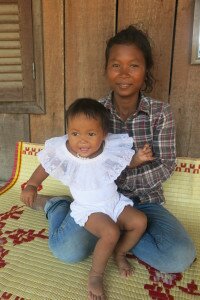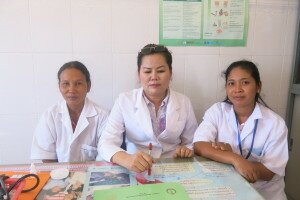 18 March 2016
18 March 2016
Mrs Hout Phally is a 38-year-old midwife in the Hospital of Trapaing Kraloeung, Phnom Srouch operational District, Kampong Speu province. She felt insecure in some professional situations, and was often unsure about the correct course of action to take in medical emergencies as she lacked knowledge. Now, thanks to further professional training, Mrs. Hout Phally has improved her technical skills and recently applied these skills during a complicated delivery.
Many midwives working in hospitals and health centers in Cambodia lack essential knowledge required to deliver high quality health services, resulting in inadequate treatment for mothers and newborns. To improve delivery, postpartum and newborn care, the Royal Government of Cambodia initiated ‘The Fast Track Initiative Road Map for Reducing Maternal and Newborn Mortality for 2010-2015’. Through the Maternal and Newborn care project, GIZ has backed Cambodia’s efforts to reduce maternal and neonatal mortality by among others providing training and capacity building for hospitals and health centers in Kampong Speu, Kampot, Kep and Kampong Thom.
The GIZ project provides funds and technical support to the Provincial Health Department (PHD) to enhance capacity of midwives at Emergency Obstetric and Newborn Care (EmONC) facilities. A particular focus is the capacity to perform the seven signal functions[i] of EmONC. The program aims to reduce the main causes of death for mothers and newborns, including management of postpartum hemorrhage. To bring these interventions into practice, the project supports quarterly meetings of the Midwifery Coordination Alliance Team (MCAT)[ii] with health center and referral hospital midwives. In addition, continuous supervision, necessary equipment, training courses for midwives, and coaching are provided in the coverage area.
In 2015, the project supported training courses on Basic Emergency Obstetric and Newborn Care (BEmONC) for midwives and doctors working in health centers and referral hospitals. The project covered around 90% of EmONC staff in 24 EmONC facilities across 12 operational health districts and 4 provinces. This achievement saved numerous women’s lives in the coverage areas.
The benefits of the programme are described by Ms. Hout Phally. She had a patient called Ms. Bou Sokha, a 24 year old woman, who was pregnant for the first time. She came to Trapaing Kroloeung Hospital accompanied by her husband and father one evening in May 2015. At midnight, Ms. Sokha was felt she was in labor but her delivery did not progress as the membrane did not rupture naturally. The midwives considered transferring Ms. Sokha to the provincial hospital while examining her condition every few hours. Transfer was not necessary as in the early morning the membrane ruptured. Ms. Sokha was in constant pain between contractions.
 Ms. Sokha’s delivery was attended by Ms. Phally and her colleagues Ms. Sao Ry and Ms. Prum Khen. During Ms. Sokha’s delivery the midwives identified signs of complications and decided to use the vacuum extractor to assist the delivery. The skills required for this procedure had recently been taught at an MCAT meeting. After the delivery, the midwives treated a second complication, a retained placenta, by manually removing the placenta. Later, Ms. Phally identified extensive bleeding in her patient, suggesting the entire placenta had not come away. Here, a second set of skills taught at the MCAT meetings was applied to care for this seriously hemorrhaging patient. The midwives administered oxytocin 10 IU and massaged Ms. Sokha’s uterus. Eventually the bleeding ceased and Ms. Sokha’s condition returned to normal. The midwives monitored her condition for a further 2 hours. Ms. Phally also advised Ms. Sokha to start early initiate breastfeeding, put her baby on skin to the skin and return back. Thus, their actions during this delivery saved Ms. Sokha’s life.
Ms. Sokha’s delivery was attended by Ms. Phally and her colleagues Ms. Sao Ry and Ms. Prum Khen. During Ms. Sokha’s delivery the midwives identified signs of complications and decided to use the vacuum extractor to assist the delivery. The skills required for this procedure had recently been taught at an MCAT meeting. After the delivery, the midwives treated a second complication, a retained placenta, by manually removing the placenta. Later, Ms. Phally identified extensive bleeding in her patient, suggesting the entire placenta had not come away. Here, a second set of skills taught at the MCAT meetings was applied to care for this seriously hemorrhaging patient. The midwives administered oxytocin 10 IU and massaged Ms. Sokha’s uterus. Eventually the bleeding ceased and Ms. Sokha’s condition returned to normal. The midwives monitored her condition for a further 2 hours. Ms. Phally also advised Ms. Sokha to start early initiate breastfeeding, put her baby on skin to the skin and return back. Thus, their actions during this delivery saved Ms. Sokha’s life.
Ms. Phally finds the MCAT useful for acquiring new knowledge, best practices and exchanging experience among health center and referral hospital staff. She appreciates the support of GIZ, the opportunity to participate in MCAT meetings, and attendance on a BEmONC course, which improved both her knowledge and working methods. Ms. Phally strongly desires the GIZ-Maternal and Newborn care project’s continued support of these activities in order to improve quality of delivery by trained health workers. The trainings and the support of MCAT meetings led not only to improvements in individuals but also to systematic improvements.
[i] BEmONC (1)Administration of parenteral antibiotics, (2)Administration of parenteral oxytocic drugs (3) Severe pre-eclampsia/eclampsia management and MgSo4 Administration of parenteral anticonvulsants, (4) Manual removal of placenta, (5)Removal of retained products, (6) Assisted vaginal delivery (vacuum extraction) and (7) Newborn resuscitation by using a bag and mask. CEmONC is 7 in BEmONC plus Caesarian section and Blood Bank
[ii] MCAT is organized every quarter at OD level. OD MCH and/or Referral Hospital midwife review results of supportive supervision at health centers, focusing on what problem areas can be improved, why the problems. occurred, how to solve them, and creating an action plan

